| Srl | Item |
| 1 |
ID:
193299
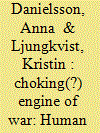

|
|
|
|
|
| Summary/Abstract |
This article explores the question of human agency in military targeting. Targeting is one of the key drivers of war. When studied by academic disciplines, much interest has been devoted to the ethics and effects of military targeting. Less debated, but focused here, is the question of the conditions of human agency within military targeting. In the literature that does exist on this topic, there is a questioning of the traditional conception of human agency but at the same time a lack of closer conceptualisation of different kinds of articulations of human agency in the targeting process. In this article, we propose a recentring of human agency in critical scholarship on military targeting. With inspiration from Theodore Schatzki's work on ‘practice’, by analytically approaching targeting as a practice, and through various examples from Operation Iraqi Freedom, the article develops and illustrates a framework for the conceptualisation of human agencies in targeting. This framework distinguishes articulations of agency based on whether they furthered the (temporary) ordering of the targeting practice or challenged its internal organising elements. The study of military targeting is significant not least since the phenomenon is one of the key ‘engines’ and drivers of war's constant becoming.
|
|
|
|
|
|
|
|
|
|
|
|
|
|
|
|
| 2 |
ID:
179966
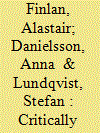

|
|
|
| 3 |
ID:
143788
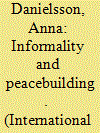

|
|
|
|
|
| Summary/Abstract |
Informal economies' relevance for peacebuilding is widely acknowledged. By providing an alternative interpretation in relation to the view that informality emerges in post-conflict environments due to the state's institutional weakness, this article contends that in Kosovo the principles of informality and its reproduction are inherent to informality itself. The article turns to the analytics of Pierre Bourdieu in order to reveal aspects of Kosovar informality left unexamined by established approaches. It illustrates how intrinsic inequalities and power relations constitute and reproduce informal economic practices throughout a circular rationale. Rather than a direct function of state weakness, informality in Kosovo is an effect of agents' engagement in knowledgeable and everyday practices. Agents' susceptibility contributes to the temporary fixing of meanings and doings that enable differentiations yet also interdependencies between relatively powerful and relatively powerless businesses. The article reflects on the implications of an intrinsic rationale for the politics of informality within peacebuilding operations.
|
|
|
|
|
|
|
|
|
|
|
|
|
|
|
|
| 4 |
ID:
171790
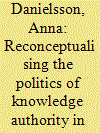

|
|
|
|
|
| Summary/Abstract |
Peacebuilding debates increasingly revolve around questions about knowledge and expertise. Of particular interest is what (and whose) knowledge(s) ends up authoritative in interventions. This article addresses a problem in the literature on the epistemics and epistemic authority of peacebuilding interventions: the acknowledgement of but lacking attention to plural knowledges, the transgressive character of expertise, and knowledge struggles. It does this by discussing recent suggestions that peacebuilding epistemic authority can be fruitfully analysed as a Bourdieusian field. The article identifies a tension in Bourdieu's own thinking about fields, which has shaped some of these recent proposals. This tension, nevertheless, also enables a reconsideration of fields and struggles, and thereby an analysis that takes plurality and transgressiveness into account. By developing such an alternative conceptual position, the article sees peacebuilding epistemic authority as object- and struggle-bound; conditioned and dependent on dynamics that go beyond peacebuilding as a distinct field of practice. This position is illustrated in an analysis of the emergence and (temporary) establishment of epistemic authority in peacebuilding interventions on informal economies.
|
|
|
|
|
|
|
|
|
|
|
|
|
|
|
|
| 5 |
ID:
171932
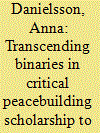

|
|
|
|
|
| Summary/Abstract |
In light of the recent turn to ‘inclusivity’ in peacebuilding practice, this article problematises established ways of ‘doing critique’ in peacebuilding scholarship. Inclusivity refers to the building of peace as a situated and co-constituted process. This entails what can be termed a new epistemic commitment: the acknowledgement that peacebuilding as a dynamic and emergent phenomenon is also an epistemically co-constituted process. In the article, I make two arguments. First, the move towards inclusivity places currently dominant modes of scholarly critique at an impasse. Persistent ontological and epistemological binaries preclude a productive investigation and challenging of inclusivity projects and their epistemic commitment. Second, I argue that, by returning to historical conditions that were formative in the very emergence of the category of ‘the local’, the conceptual basis of an alternative mode of critique (re)appears. This alternative critical project allows for an analytical sensibility to peacebuilding as emergent and adaptive. It makes it possible to disentangle power relations as these emerge between different and possibly unexpected configurations of actors and knowledge claims in inclusivity projects
|
|
|
|
|
|
|
|
|
|
|
|
|
|
|
|